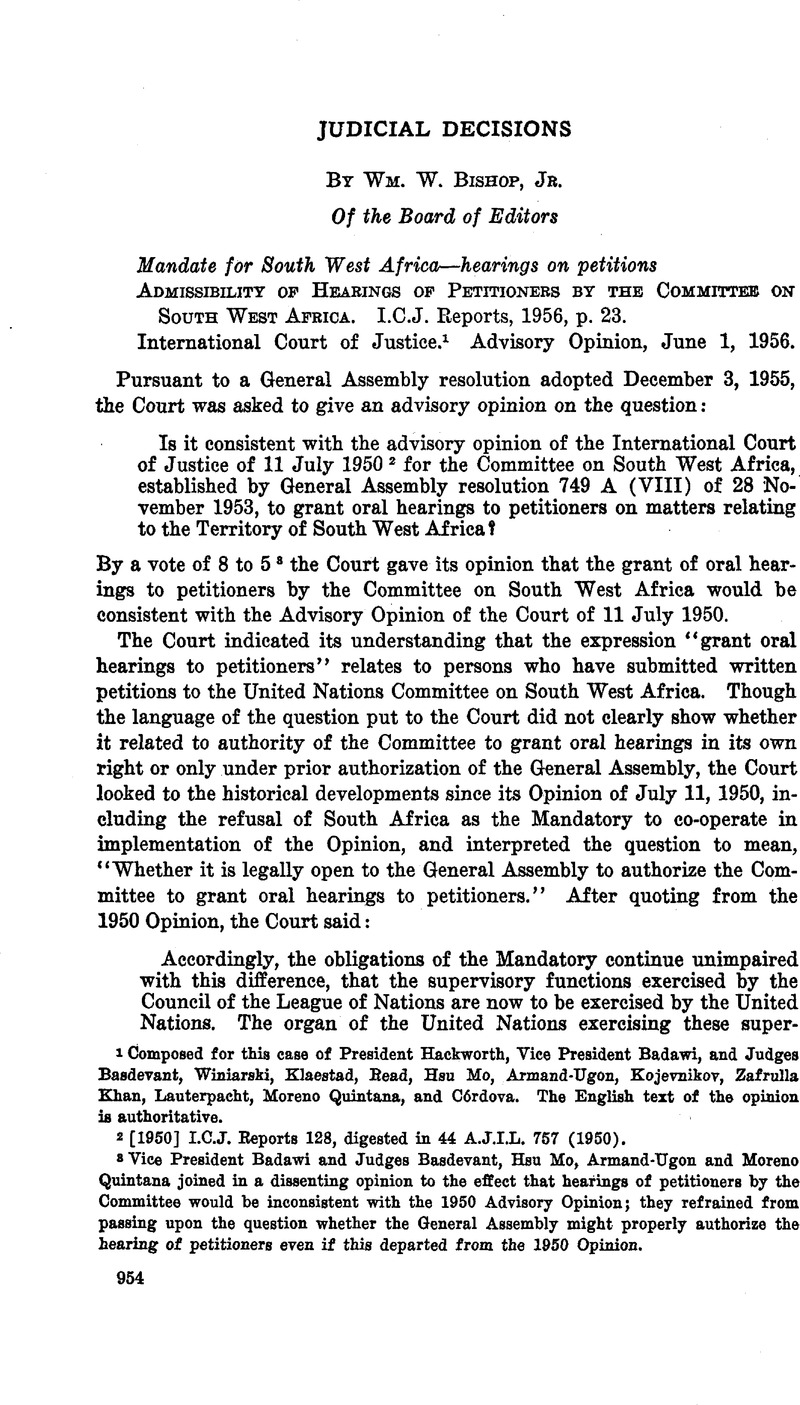No CrossRef data available.
Published online by Cambridge University Press: 28 March 2017

1 Composed for this case of President Hackworth, Vice President Badawi, and Judges Basdevant, Winiarski, Klaestad, Read, Hsu Mo, Armand-Ugon, Kojevnikov, Zafrulla Khan, Lauterpacht, Moreno Quintana, and Córdova. The English text of the opinion is authoritative.
2 [1950] I.C.J. Reports 128, digested in 44 A.J.I.L. 757 (1950).
3 Vice President Badawi and Judges Basdevant, Hsu Mo, Armand-Ugon and Moreno Quintana joined in a dissenting opinion to the effect that hearings of petitioners by the Committee would be inconsistent with the 1950 Advisory Opinion; they refrained from passing upon the question whether the General Assembly might properly authorize the hearing of petitioners even if this departed from the 1950 Opinion.
4 [1955] I.C.J. Reports 67, digested in 49 A.J.I.L. 565 (1955).
5 Judges Winiarski and Kojevnikov voted in favor of the Opinion, but declared their inability to accept parts of the reasoning of the majority.
Judge Lauterpacht prepared a long separate opinion, concurring in the result. He approached the problem of interpreting the 1950 Opinion as analogous to interpreting international agreements “in a manner calculated to secure their effective operation.” Although he believed that there would be no authority to grant oral hearings to petitioners if South Africa were fulfilling its obligations as Mandatory in the matter of annual reports and petitions, Judge Lauterpacht thought the Court should answer:
“It is consistent with the Advisory Opinion of 11 July 1950 for the Committee on South West Africa to grant oral hearings to petitioners from that territory whenever, and so long as, owing to the absence of such co-operation on the part of the Mandatory, the Committee feels constrained, in order to fulfil the duty entrusted to it by the General Assembly, to use sources of information other than those which would be normally available to it if the Mandatory were willing to assist the Committee in obtaining information in accordance with the procedure as it existed under the League of Nations.”
This conclusion was reached on the premise that:
“It is a sound principle of law that whenever a legal instrument of continuing validity cannot be applied literally owing to the conduct of one of the parties, it must, without allowing that party to take advantage of its own conduct, be applied in a way approximating most closely to its primary object. To do that is to interpret and to give effect to the instrument—not to change it.”
The 1950 Opinion, accepted and approved by the General Assembly, “is the law recognized by the United Nations,” despite the fact that “the Government of South Africa has declined to accept it as binding upon them and although it has acted in disregard of the international obligations as declared by the Court in that Opinion.” In appraising the situation resulting from this conduct of the Mandatory the applicable legal principles were: “that the Opinion of 1950 must be read as a whole; that it cannot be deprived of its effect by the action of the State which has repudiated it; and that the ensuring of the continued operation of the international regime in question is a legitimate object of the interpretative task of the Court.” Confronted with the situation “of a party refusing to recognize or to act upon a legal instrument which purports to express the legal obligations of that party and whose validity must, as in the present case, be regarded as continuing,” Judge Lauterpacht said a court of law should “interpret the instrument as continuing in validity and as fully applicable subject to reasonable readjustments calculated to maintain the effectiveness, though not more than that, of the major purpose of the instrument.”
1 Justice Frankfurter reserred his opinion; Warren, C. J., and Black and Douglas, JJ. dissented.
1 From manuscript copy of opinion made available by Wm. R. Vallance, Esq., of Washington, D. C.
2 See 26 Dept. of State Bulletin 984 (June 23, 1952), commented on in 47 A.J.I.L. 93 (1953).
1 43 A.J.I.L. Supp. 8 (1949).
1 Affirmed on opinion below, [1956] Ontario Weekly Notes 363 (Ontario Court of Appeal, April 5, 1956).
2 In Yin-Tso Hsiung v. Toronto, [1950] 4 D.L.R. 209, digested in 45 A.J.I.L. 595 (1951).
3 Mehr v. Law Society of Upper Canada, [1955] 2 D.L.R. 289.